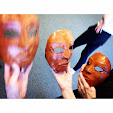Besides, a younger friend of theirs had gone, and people were saying it's fine for kids.
Whoa, was I mistaken. Neither one of them liked the violence, the volume, the velocity—the three off-putting Vs of PG13dom. I don't know how Kids-in-Mind decided to rate the violence at 6. How could a man bound to a table to be tortured, a large insect forced down his throat, rate a 6? What kind of torture gets a 10? It feels like the world is getting less sensitive, but I'm becoming more grateful for my children's sensitivity.
My son is a particular fan of the MPAA ratings system—he even has it tacked to his bedroom wall. Because of him I've adjusted my attitude toward ratings. When I was single and living in New York, I once interviewed the director Abel Ferrara and recall his outrage that his teenage son might be prohibited from seeing whatever movie he liked. From his point-of-view it was a self-expression issue, and I agreed.
For my son, it's a self-protection issue. He values the ratings system because he's not ready for sexual themes, he doesn't like seeing cruelty, especially if it's aimed at animals, and Hollywood movies tend to overwhelm him with their explosions, constant orchestral climaxing, and endless chase sequences. He's the one sitting through the previews with his fingers in his ears.
Another reason my kids didn't go in for STAR TREK is that they lack the allegiance, formed over decades, to the series that my husband and I have. While we are not Trekkers, I for one spent a good deal of my youth with the crew of the Enterprise. Naturally I paid close attention to the women, the few there were: Nurse Christine Chapel, Yeoman Janice Rand, and the biggie: Lt. Uhura.
 Uhura and the actor who played her, Nichelle Nichols, carry a lot of cultural heft. Nichols was one of the first Black women on a TV series not to play a domestic worker (Diahann Carol in the 1968 Julia was another trailblazer I watched without quite understanding, but maybe intuiting, the import—I was seven that year). An episode in which she kissed William Shatner broke a barrier. After the first season, she thought of quitting, but Martin Luther King, Jr. persuaded her to stay on, citing the impact she was having.
Uhura and the actor who played her, Nichelle Nichols, carry a lot of cultural heft. Nichols was one of the first Black women on a TV series not to play a domestic worker (Diahann Carol in the 1968 Julia was another trailblazer I watched without quite understanding, but maybe intuiting, the import—I was seven that year). An episode in which she kissed William Shatner broke a barrier. After the first season, she thought of quitting, but Martin Luther King, Jr. persuaded her to stay on, citing the impact she was having.Her character never rose to the prominence many viewers would have liked, and struggled in relative obscurity even when STAR TREK crossed into feature film territory.
But it still shocked me, though maybe it shouldn't have, to see how little the capable Zoe Saldana has to work with in the new STAR TREK. While her brethren are given
 emotionally rich origin stories to add depth to their relationships, she is left with a gag about her first name and a running sex joke about her professional field of linguistics. It's implied that she wants to serve on the Enterprise in order to be near her boyfriend, Spock. Gone is the dignity of the TV version of Uhura, who once came upon a shipmate and began speaking Swahili with him (too bad he turned out to be a monster in disguise). I will never forget sitting in my suburban living room listening to Swahili and thinking it the most beautiful language I'd ever heard.
emotionally rich origin stories to add depth to their relationships, she is left with a gag about her first name and a running sex joke about her professional field of linguistics. It's implied that she wants to serve on the Enterprise in order to be near her boyfriend, Spock. Gone is the dignity of the TV version of Uhura, who once came upon a shipmate and began speaking Swahili with him (too bad he turned out to be a monster in disguise). I will never forget sitting in my suburban living room listening to Swahili and thinking it the most beautiful language I'd ever heard.


No comments:
Post a Comment